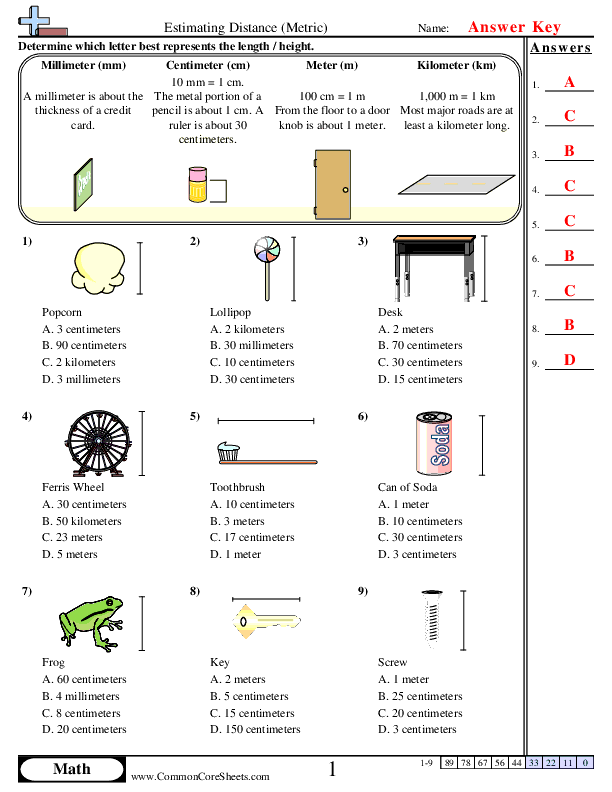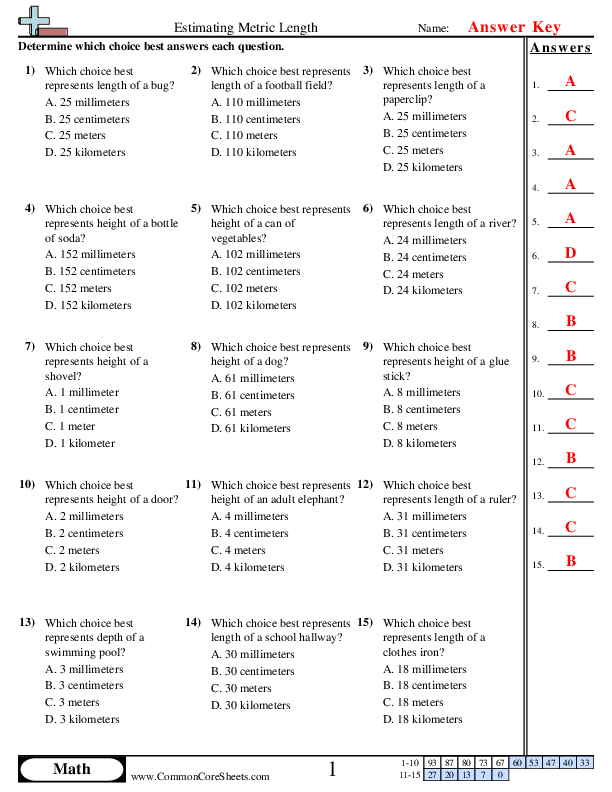Looking for the best measurement worksheets on the internet? Look no further! Our measurement worksheets are designed to help students of all ages learn and practice the important skill of measurement. From length and weight to volume and capacity, our worksheets cover a wide range of topics to ensure a well-rounded understanding of measurement concepts. And the best part? They're all free! Simply download and print as many copies as you need for your classroom or home use. These measurement worksheets are a great resource for teachers, students, and parents looking to improve their measurement skills. Try them out today and see the difference they can make in your understanding of measurement.
Browse Sheets By Problem Type
×

Estimating Length (Metric)
4md1


×
Description:
"This worksheet is designed to enhance children's mathematical skill in estimating distances using the metric system. Comprising nine problem sets, it employs everyday items, from shovels to envelopes, to facilitate comprehension. Perfect for distance learning, these problems can be converted into customizable flashcards for effective learning and easy recall."

×
Student Goals:
Understand Distance MeasurementAfter successfully completing this worksheet, students should attain a comprehensive mastery of distance measurements in metric units. They should be able to recognize and differentiate between millimeters, centimeters, meters, and kilometers, understanding how they relate to each other and how they are used to represent lengths and distances in the real world.Estimating TechniquesFurthermore, students will develop the skill to make accurate estimations. They will be able to gauge the distances of various everyday items without employing measuring instruments, based on their understanding of the comparative lengths of different metric units. Hence, they will understand the application of these units in day-to-day scenarios.Critical Thinking and Problem SolvingWith the knowledge obtained from the worksheet, students should be equipped with better problem-solving and critical thinking abilities. They will be capable of making smart choices from provided options in estimating the length or distance of things. This will be especially useful in instances where precision measuring tools are not readily accessible.Application to Real-life ContextsFinally, students should be able to apply the skills learned in practical real-world contexts. They will understand that the same methods used in estimating the length of a glue stick, or the distance covered in a trip, can be used to solve more complex mathematical problems.Relevance in Other Subject AreasThis knowledge will be useful in overcoming challenges not only in Math but also in other subjects that require measurements such as Science and Geography. For instance, having a good grasp of distances could aid in the study of habitats or geographical features.Build ConfidenceCompletion of the worksheet can build confidence in students, as they would be able to see that mathematics and measurements are concepts that they can grasp and use in their everyday lives. This could lead to a deeper interest in math and other related subjects, encouraging them to explore these further.



Determining Appropriate Measurement (Metric)
4md1


×
Description:
"This worksheet is designed to help children practice estimation of metric lengths. It offers 15 mathematical problems dealing with real-world objects, varying from daily household items to larger landscapes, to improve the grasp of metric units. This versatile aid can be customized based on a learner's level, transformed into flashcards for revision, or incorporated into distance learning curriculums to effectively and engagingly teach metric length estimation."

×
Student Goals:
Understanding of Metric UnitsAfter completing the worksheet, students should have gained a clear understanding of various metric units of length such as millimeters, centimeters, meters, and kilometers. They will also comprehend how these units relate to real-world objects, enhancing their understanding of metric scales.Problem Solving SkillsThe worksheet aims to enhance critical thinking and problem-solving skills in a student. As they navigate through the problems, they are encouraged to make logical decisions on what metric units best represent the given objects—thus, equipping them with fundamental problem-solving abilities.Practical Application of Math ConceptsPost worksheet completion, students should be able to apply the mathematical concepts learned in practical scenarios. They will be equipped to estimate and measure lengths of various objects around them accurately using the correct metric units.Conceptual KnowledgeStudents will also assimilate conceptual knowledge about the size and scale of everyday items, which will be beneficial not only in their mathematical journey but also in general cognitive development. They will understand the typical length of objects, their comparison, and get a sense of spatial awareness.Improved Estimation SkillsThe worksheet is designed to help students significantly improve their estimation skills. By solving problems that involve estimating the length of various items, students will develop a better sense of judgment. They will learn to make accurate estimates, a skill that is essential in many areas of life beyond math.Strengthens Logical ReasoningUpon completion, students should exhibit improved mental agility and logical reasoning. Probing the metric length of everyday objects and comparing choices demands regular practice for cognitive development, which in turn strengthens their logical reasoning skills.Confidence in Handling MeasurementsStudents will attain familiarity and confidence in dealing with measurements in their day-to-day encounter. By linking realistic objects to measurements, theoretical concepts of metrics and measurements become more approachable and less abstract.




